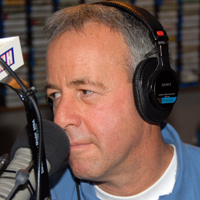I’ve heard more than a few people refer to Tom Petty, who died Monday of cardiac arrest at the age of 66, as a "regular guy."
Kind of. Maybe. I’m not certain; I never met him. And as one of millions who shares the adoration that accompanies that comment, I get it. But he had so many irregular experiences that earning that description is a testimony to his humbleness.
I believe Tom Petty was humble and honest. But he certainly wasn’t average.
The biographies say his father was abusive. No matter the reasoning behind a prior generation’s inability to comprehend an artistic quiet nature, there can be little doubt that the toll on an innocent young soul can have great impact.
It’s certainly not every ordinary kid who has an uncle working on an Elvis Presley movie. At about the age of 10, Petty had the chance to visit the set and meet Elvis. The "Yeah, hi" he got from The King might have contributed to that humility.
Don Felder, who went on to join The Eagles, was one of his first guitar teachers.
Like so many of us around in 1964, he saw The Beatles on TV. But when he heard The Byrds, something lit the light on the cooking stew that became his first band, Mudcrutch.
All the factual aspects of a career in music are well-documented, and they're as good as it gets. He sold 80 million records. Inducted into the Hall of Fame. But I keep thinking about that description of being a regular guy.
My favorite Tom Petty story goes back to 1981.
He was about to release his album, "Hard Promises," and his record company, MCA, was trying to push the boundaries on LP pricing. Most albums sold for $8.98, but they had just experimented with a couple priced at $9.98. The kids who had to have them had to pay for them.
So the "suits" told Petty his next album was one of those slated for increased profitability. Petty balked and told them, if they did that, he would call the release, "The $8.98 Album." Good luck explaining that to consumers. Petty won.
That may be a cool story, but as a Milwaukeean, my personal memories will never be eclipsed by the many wine cooler-soaked summer nights along the lakefront when Petty played Summerfest. His 14th and 15th appearances this year put him firmly in the lead as the most-returned headliner. Sadly, there will be no 16th visit.
Of course, the songs provide the most enduring memories.
I screamed these words (to the dismay of those sitting around me) at Summerfest shows:
Somewhere, somehow, somebody must have kicked you around some
Tell me why you want to lay there, revel in your abandon
Honey, it don't make no difference to me baby
Everybody has to fight to be free
As someone that has spent decades on the radio, these lyrics pop in my head every Sunday morning:
Well the top brass don't like him talking so much
And he won't play what they say to play
And he don't want to change what don't need to change
There goes the last DJ
Who plays what he wants to play
And says what he wants to say
And, in difficult times, I found myself thinking:
No, I'll stand my ground
Won't be turned around
And I'll keep this world from draggin' me down
Gonna stand my ground
Speaking of difficult times, I distinctly remember going through something personal years ago and trying to be stoic, silent and dismissive about it.
In other words, I didn’t share my difficulties and, while I probably thought myself tough, I have a feeling something showed.
Years later, I found myself in the same situation. But the second time, I consciously decided to be an open book. I wasn’t whiny, but I hid nothing and spoke about it to anyone that wanted to hear.
The ease and empathetic reaction amazed me.
I bring up that analogy because, as I theorized earlier, Tom Petty was honest and humble. I lucked into it as an experiment. He lived it. That is why, among amazing and anything-but-average gifts, his honesty came through in his songs.
That’s why we saw him as a regular guy. And it's why his songs will live forever.
Rock & Roll Roots on Sunday, Oct. 8, from 9 a.m. until noon, will devote all three hours to the music of Tom Petty on 96.5 WKLH.
Two responses came back, including one janitor position. Steve took the other: the opportunity to hang out at WUWM.
After that, he worked at WAUK, then WQFM, then WZUU, then back to WQFM ... and finally worked afternoons at WKLH for a little while.
"I gave up Eddie Money to earn money in 1986," says Steve, who eventually entered the world of commercial real estate.
"But 23 years ago WKLH offered me the chance to wake up early every Sunday morning," he says. "I mean every Sunday morning. I mean like 5:30 am. I mean no matter what I did on Saturday night. Live every Sunday morning. I love it."







